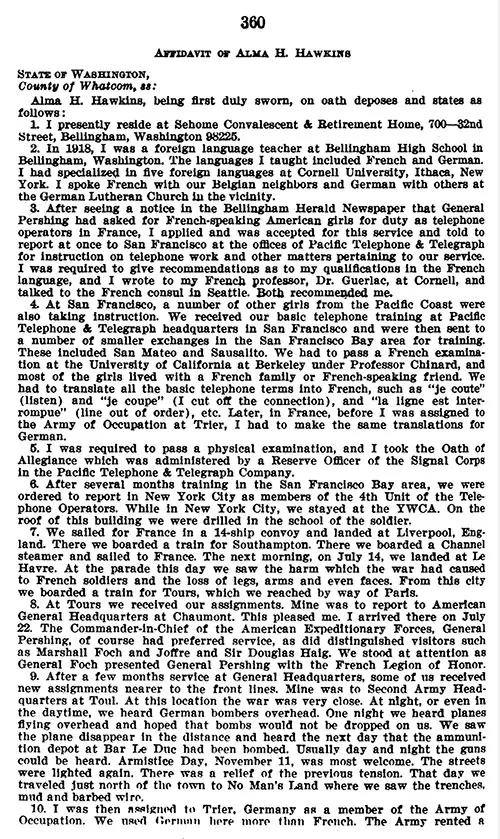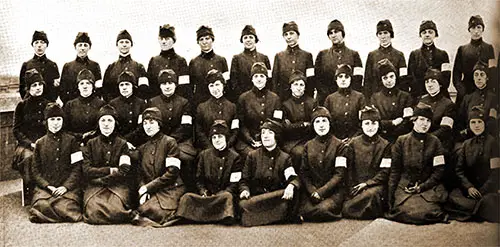Affidavit of Alma H. Hawkins - 1977

Page 360 of Appendix B: Affidavit of Alma H. Hawkins, Recognition for Purpose of VA Benefits, Hearing Before the Committee on Veterans' Affairs, United States Senate, Ninety-Fifth Congress, First Session, on S. 247, S. 1414, S. 129, and Related Bills, 25 May 1977. US Government Printing Office, 1977. GGA Image ID # 19a2cafb88
Alma H. Hawkins was a Signal Corps telephone operator assigned to Unit 4. Her affidavit was used in support before congress for the "Hello Girls" to obtain VA Benefits in hearings that took place in 1977.

Left Side: Fourth Unit of Telephone Operators for General Pershing's Army Trained by the Bell System and Ready for Overseas Service. Photographed on the Roof of 195 Broadway, New York, June 13, 1918. They are (left to right): Top Row — Miss Kathleen M. Hyatt, Miss Albertine M. Belhumeur, Miss Evelyn C. La Riviere, Miss Alma H. Hawkins, Miss Mary Marshall, Miss Eugene J. Couture, Miss Emma Riendeau, Miss Lillie H. Noble, Miss Louise Maclin, Miss Vivienne Hamel, Miss Louise L. Armand, Middle Row — Miss Edmee LeRoux, Miss Melanie Van Gastel, Miss Aurelie C. Lucier, Miss Stella M. Viau, Miss Berthe Arlaud, Miss Helen E. Hill, Miss E. Tilleard, Miss Juliette Courtail, Miss Eleanor Hoppock, Mrs. Eileen Munro, Miss Beatrice Francfort, Front Row —Miss Lucienne Bigou, Miss Camille Rieder, Miss Agnes G. Burge, Miss Ruth Couturier, Miss Louise Chaix, Miss Mathilde Ferrie, Miss Leonie Peyron, Miss Georgette Boehrer, Miss Mary Story. The Telephone Review, July 1918. GGA Image ID # 1923793cac
Affidavit of Alma H. Hawkins
State of Washington,
County of Whatcom, ss:
Alma H. Hawkins, being first duly sworn, on oath deposes and states as follows :
- I presently reside at Sehorne Convalescent & Retirement Home, 700—32nd Street, Bellingham, Washington 08225.
- In 1918, I was a foreign language teacher at Bellingham High School in Bellingham, Washington. The languages I taught included French and German. I had specialized in five foreign languages at Cornell University, Ithaca, New York. I spoke French with our Belgian neighbors and German with others at the German Lutheran Church in the vicinity.
- After seeing a notice in the Bellingham Herald Newspaper that General Pershing had asked for French-speaking American girls for duty as telephone operators in France, I applied and was accepted for this service and told to report at once to San Francisco at the offices of Pacific Telephone & Telegraph for instruction on telephone work and other matters pertaining to our service. I was required to give recommendations as to my qualifications in the French language, and I wrote to my French professor, Dr. Guerlac, at Cornell and talked to the French consul in Seattle. Both recommended me.
- At San Francisco, a number of other girls from the Pacific Coast were also taking instruction. We received our basic telephone training at Pacific Telephone & Telegraph headquarters in San Francisco and were then sent to a number of smaller exchanges in the San Francisco Bay area for training. These included San Mateo and Sausalito. We had to pass a French examination at the University of California at Berkeley under Professor Chinard, and most of the girls lived with a French family or French-speaking friend. We had to translate all the basic telephone terms into French, such as “je coute” (listen) and “je coupe” (I cut off the connection), and “la ligne est interrompue” (line out of order), etc. Later, in France, before I was assigned to the Army of Occupation at Trier, I had to make the same translations for German.
- I was required to pass a physical examination, and I took the Oath of Allegiance, which was administered by a Reserve Officer of the Signal Corps in the Pacific Telephone & Telegraph Company.
- After several months of training in the San Francisco Bay area, we were ordered to report in New York City as members of the 4th Unit of the Telephone Operators. While in New York City, we stayed at the YWCA. On the roof of this building, we were drilled in the school of the soldier.
- We sailed for France in a 14-ship convoy and landed at Liverpool, England. There we boarded a train for Southampton. There we boarded a Channel steamer and sailed to France. The next morning, on July 14, we landed at Le Havre. At the parade this day, we saw the harm which the war had caused to French soldiers and the loss of legs, arms, and even faces. From this city, we boarded a train for Tours, which we reached by way of Paris.
- At Tours, we received our assignments. Mine was to report to American General Headquarters at Chaumont. This pleased me. I arrived there on July 22. The Commander-in-Chief of the American Expeditionary Forces, General Pershing, of course, had preferred service, as did distinguished visitors such as Marshall Foch and Joffre and Sir Douglas Haig. We stood at attention as General Foch presented General Pershing with the French Legion of Honor.
- After a few months of service at General Headquarters, some of us received new assignments nearer to the front lines. Mine was to Second Army Headquarters at Toul. At this location, the war was very close. At night, or even in the daytime, we heard German bombers overhead. One night we heard planes flying overhead and hoped that bombs would not be dropped on us. We saw the plane disappear in the distance and heard the next day that the ammunition depot at Bar Le Duc had been bombed. Usually, day and night, the guns could be heard. Armistice Day, November 11, was most welcome. The streets were lighted again. There was a relief of the previous tension. That day we traveled just north of the town to No Man’s Land, where we saw the trenches, mud, and barbed wire.
- I was then assigned to Trier, Germany as a member of the Army of Occupation. We used German here more than French. The Army rented a lovely mansion for us. One night there was a robbery in the house, in which a number of things were taken. Thinking that we needed protection, military police were sent to guard the house each night.
- I remained at Trier until July 1919, when I received orders to proceed towards home. En route, in Paris, the Central Operating Unit indicated a need for me, so I was held on temporary duty there. Sometime after that, I traveled to Nantes, from which port I traveled to the United States on a United States Navy warship, landing in Boston. From Boston, I traveled by train to my home in Bellingham.
- We received many honors while in France. I received a citation for meritorious service from General Pershing and another for meritorious service from the Commanding General of the Second Army at Toul.
- At all times, we wore uniforms prescribed by the Signal Corps with regulation Signal Corps insignia. These have been fully described in affidavits of other operators which I have seen. At all times during my service, I considered myself every bit as much a member of the United States Army as any male member. We considered ourselves as soldiers in the United States Army and were treated at all times by officers and enlisted men as if we were members of the Army. At no time did we consider ourselves similar to clerks and other civilian employees employed by the Army in France.
- It was a distinct shock to me to learn, when I returned home, that in our service with the Army, the Army had not considered the Signal Corps women as actually having been enlisted. I very much hope that this unfair situation can be rectified so that we can be accorded our true veterans’ status.
Alma H. Hawkins.
Subscribed and sworn to before me this 13th day of May 1977.
Gordon L. __________,
Notary Public in and for the State of Washington residing at Bellingham.
"Appendix B: Affidavit of Alma H. Hawkins," in Recognition for Purposes of VA Benefits, Hearing before the Committee on Veterans' Affairs, Unted States Senate, Ninety-Fifth Congress, First Session on S. 247, S. 1414, S. 129, and Related Bills. Washington, DC: US Government Printing Office, 25 May 1977. pp. 360-361
